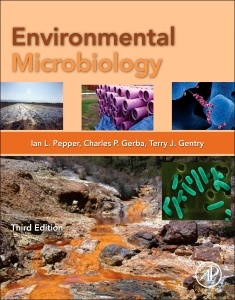Description
Environmental Microbiology (3rd Ed.)
Coordinators: L Pepper Ian, Gerba Charles P., J Gentry Terry
Language: English
Subject for Environmental Microbiology:
728 p. · 20.9x27.7 cm · Hardback
Description
/li>Contents
/li>Readership
/li>Biography
/li>Comment
/li>
Designed for advanced undergraduate students, graduate students, and environmental professionals, this book builds upon the tremendous success of the previous editions with a comprehensive and up-to-date discussion of environmental microbiology as a discipline that has greatly expanded in scope and interest over the past several decades. From terrestrial and aquatic ecosystems to urban and indoor environments, this edition relates environmental microbiology to a variety of life science, ecology, and environmental science topics including biogeochemical cycling, bioremediation, environmental transmission of pathogens, microbial risk assessment, and drinking water treatment and reuse. The final chapter highlights several emerging issues including microbial remediation of marine oil spills, microbial contributions to global warming, impact of climate change on microbial infectious disease, and the development of antibiotic-resistant bacteria.
2. Microorganisms Found in the Environment
3. Bacterial Growth
4. Earth Environments
5. Aeromicrobiology
6. Aquatic Environments
7. Extreme Environments
8. Environmental Sample Collection and Processing
9. Microscopic Techniques
10. Cultural Methods
11. Physiological Methods
12. Immunological Methods
13. Nucleic Acid-Based Methods of Detection
14. Microbial Source Tracking
15. Microbial Transport in the Subsurface
16. Biogeochemical Cycling
17. Micoorganisms and Organic Pollutants
18. Microorganisms and Metal Pollutants
19. Microbial Diversity and Interactions in Natural Ecosystems
20. Microbial Communitation: Bacteria-Bacteria and Bacteria-Host
21. Bioinformation and "Omic" Approaches to Characterization/Microbial Communities
22. Environmentally Transmitted Pathogens
23. Indicator Microorganisms
24. Risk Assessment
25. Municipal Wastewater Treatment
26. Land Application of Organic Residuals: Municipal Biosolids and Animal Manures
27. Recycled Water Treatment and Reuse
28. Drinking Water Treatment and Distribution
29. Disinfection
30. Domestic and Indoor Microbiology
31. Global Emerging Microbial Issues in the Anthropocene Era
Advanced students, technicians, researchers, and consultants in environmental sciences, microbiology, environmental engineering, public health, biology, chemistry, and civil engineering
Dr. Charles P. Gerba is a Professor at the University of Arizona. He conducts research the transmission of pathogens through the environment. His recent research encompasses the transmission of pathogens by water, food and fomites; fate of pathogens in land applied wastes; development of new disinfectants; domestic microbiology and microbial risk assessment. He has been an author on more than 500 articles including several books in environmental microbiology and pollution science. He is a fellow of the American Academy of Microbiology and the American Association for the Advancement of Science. In 1998 he received the A. P. Black Award from the American Water Works Association for outstanding contributions to water science and in 1996 he received the McKee medal from the Water Environment Federation for outstanding contributions to groundwater protection. He received the 1999 Award of Excellence in Environmental Health from National Association of County and City Health Officials.
Dr. Terry Gentry is a Professor at Texas A&M University and is also the Director of the Soil and Aquatic Microbiology Laboratory (SAML). He is an environmental microbiologist specializing in the development and use of molecular technologies to enhance the detection and remediation
- Presents state-of-the-art research results with key, recent references to document information
- Emphasizes critical information using "Information Boxes" throughout
- Includes real-world case studies to illustrate concepts, along with frequent use of graphics, cartoons and photographs
- Offers questions at the end of each chapter designed to test key concepts
- Lecture slides available for instructors online




